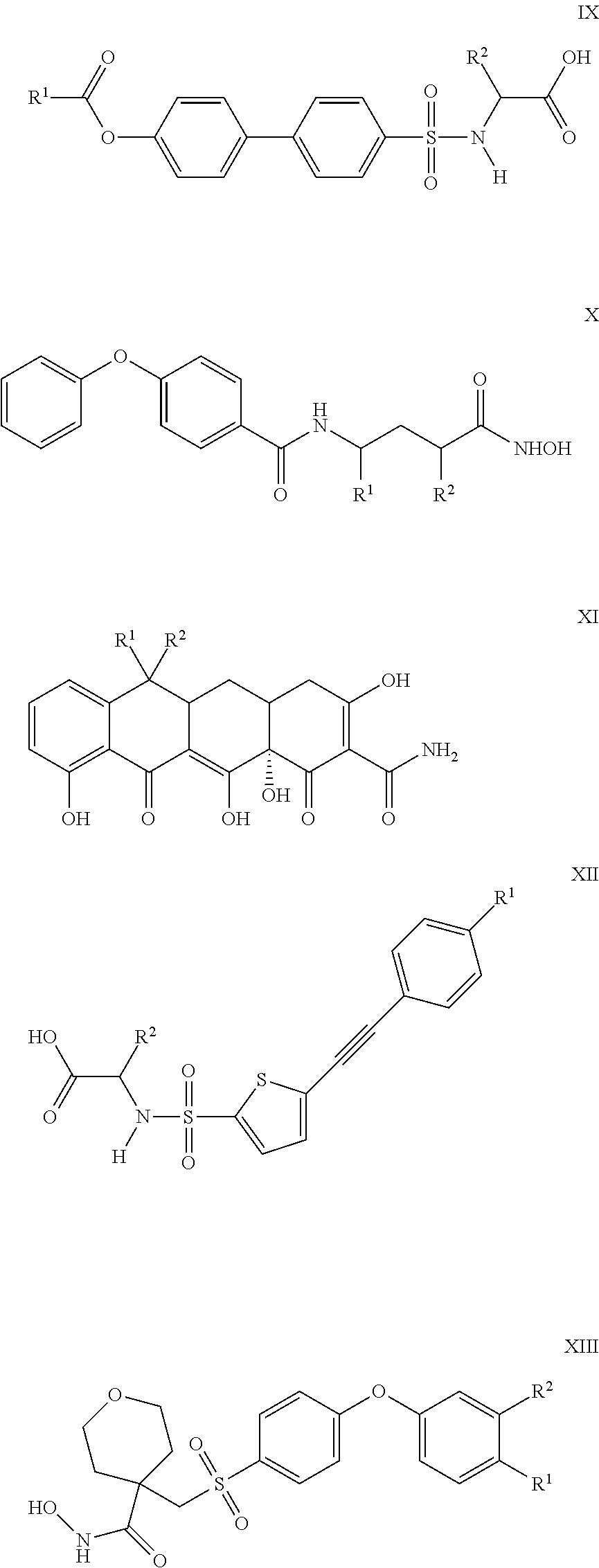Compounds and methods for the treatment of pain and other diseases
- Summary
- Abstract
- Description
- Claims
- Application Information
AI Technical Summary
Benefits of technology
Problems solved by technology
Method used
Image
Examples
example 1
[0160]
Step A
[0161]To a suspension of (R)-2-Amino-3-(1H-indol-3-yl)-propionic acid 2 (0.23 g, 1.12 mmol) (Alfa-Aesar, A-18426) in acetone (3 mL) was added 2M sodium carbonate (1 mL) to stir at room temperature for 30 minutes. To this mixture was added bromosulfonyl chloride 1 (0.13 g, 0.5 mmol) (Alfa-Aesar, A-14677) at 0° C. to stir for 15 minutes. The reaction mixture was stirred further for 1 hour at room temperature. After pouring into water (20 mL), the solution was washed with ether (×3). The aqueous layer was acidified with 1M HCl, followed by extraction with ethyl acetate (×3). The combined organic extracts were then washed with brine and dried (Na2SO4) to provide the crude (R)-2-(5-Bromo-thiophene-2-sulfonylamino)-3-(1H-indol-3-yl)-propionic acid product (3) (0.16 g, 74%). LC-MS (ES+) 429, 431; (ES−) 427, 429.
[0162]A portion of the crude (R)-2-(5-Bromo-thiophene-2-sulfonylamino)-3-(1H-indol-3-yl)-propionic acid product (3) was taken to the next step without further purificati...
example 2
[0163]
Step A
[0164]In a round bottom flask was added crude (R)-2-(5-Bromo-thiophene-2-sulfonylamino)-3-(1H-indol-3-yl)-propionic acid (3) (60 mg, 0.14 mmol), p-tolyl acetylene 4 (480 mg, 0.41 mmol), PdCl2P(PPh3)2 (10 mg, 0.015 mmol), copper(I)iodide (2 mg, 0.01 mmol) and triethylamine (0.025 g, 0.25 mmol) and then dissolved in dry DMF (2 mL) under an atmosphere of nitrogen. The reaction mixture was then heated at 50° C. under a nitrogen atmosphere for 2 hours. The reaction mixture was then cooled to room temperature and diluted with ethyl acetate and washed with a solution composed of NaCl / NaHCO3 / (NH4)2CO3 / water (1:1:1:1) (×3), water, and then dried over sodium sulfate (Na2SO4). The crude product was purified using a SAX column to provide to give the desired (R)-3-(1H-Indol-3-yl)-2-(5-p-tolylethynyl-thiophene-2-sulfonylamino)-propionic acid 5 (0.036 g, 55%).
[0165]Example 2, Reaction A was repeated with same scale as above and then combined with the previous batch. The combined produc...
example 3
Synthesis of 4-Iodotoluine (D3, 98%) Starting Material
[0166]
Step A
[0167]Following the classic method of Griess (Practical Organic Chemistry, Richard Clay & Sons, page 144, Preparation #60, (1900)) in which 0.2 grams (1.8 mmoles) of toluidine (D3, 98%), commercially obtained from C / D / N Isotopes (Quebec, Canada) (6) is combined with 0.4 ml D2SO4 (obtained commercially from Cambridge Isotope Laboratories, Andover, Mass.) and the resulting mixture cooled until the temperature of the stirred mixture reaches 0° C. and then 160 mg (2.32 mmole) of sodium nitrite was slowly added in three portions over 10 minutes making sure that the temperature does not rise above 10° C. After the sodium nitrite has been added, a solution composed of 48 mg (2.9 mmole) of KI in 1 ml D2O (obtained commercially from Cambridge Isotope Laboratories) was then added and the reaction mixture was allowed to warm to room temperature and stirred for 1 hour. The reaction mixture was then diluted with D2O (10 mL) and ex...
PUM
| Property | Measurement | Unit |
|---|---|---|
| Fraction | aaaaa | aaaaa |
| Fraction | aaaaa | aaaaa |
| Fraction | aaaaa | aaaaa |
Abstract
Description
Claims
Application Information
 Login to View More
Login to View More - R&D
- Intellectual Property
- Life Sciences
- Materials
- Tech Scout
- Unparalleled Data Quality
- Higher Quality Content
- 60% Fewer Hallucinations
Browse by: Latest US Patents, China's latest patents, Technical Efficacy Thesaurus, Application Domain, Technology Topic, Popular Technical Reports.
© 2025 PatSnap. All rights reserved.Legal|Privacy policy|Modern Slavery Act Transparency Statement|Sitemap|About US| Contact US: help@patsnap.com



